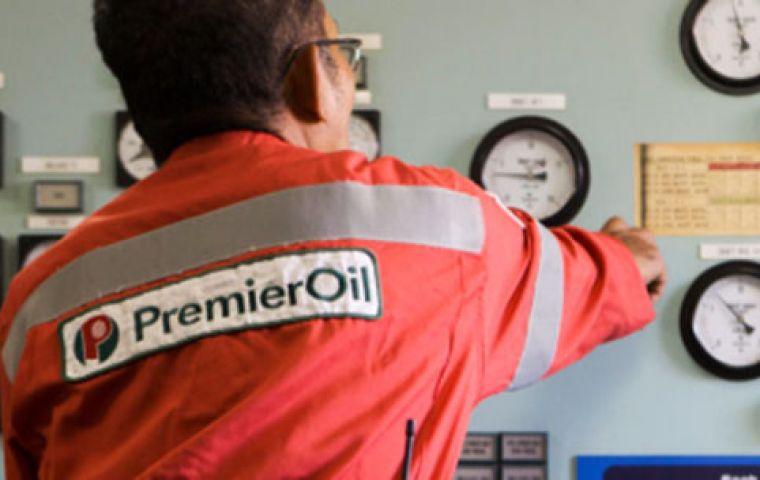MercoPress. South Atlantic News Agency
Premier record oil production helps significant cuts in its debts
 Premier has assets in the North Sea, Asia, off the Falkland Islands and Mexico. It built heavy debts before the oil price downturn in 2014
Premier has assets in the North Sea, Asia, off the Falkland Islands and Mexico. It built heavy debts before the oil price downturn in 2014  CEO Tony Durrant said he hoped the Zama field offshore Mexico would yield more than 30,000 bpd this year
CEO Tony Durrant said he hoped the Zama field offshore Mexico would yield more than 30,000 bpd this year Premier Oil has taken advantage of its second consecutive year of record oil production to make larger than expected cuts into its still-significant debts. The London-listed oil and gas developer, with interests in the Falkland Islands, expects its financial results to reveal end-of-year debts of US$2.3 billion, after removing US$390 million from the total following a sharp rise in oil output.
Production exceeded forecasts with a 7% rise to 80,500 oil barrels per day (bpd). Revenue increased 27% to US$1.4 billion, stimulated by the higher average commodity prices.
Premier also spent less than targeted on projects, with full-year capital expenditure reported at US$355 million versus US$365 million and similarly operating costs for the year were below guidance, with the new metric marked at US$ 16.9 per barrel oil equivalent.
Premier has assets in the North Sea, Asia, off the Falkland Islands and Mexico. It built heavy debts before the oil price downturn in 2014 before signing a refinancing plan in 2017.
Rising production in 2018 was mainly due to the Catcher Area in the North Sea, yielding 21,500 bpd during the year, rising to more than 34,000 bpd in November and December. The under-development Tolmount project is expected to start output from the highly anticipated Tolmount East appraisal well by the middle of this year.
Appraisal work is also underway for the extensive Zama discovery offshore from Mexico. Premier said its Zama-2 well results were “expected shortly”. CEO Tony Durrant said he hoped the field would yield more than 30,000 bpd this year.
After adjusting for disposals made during 2018, Premier forecast that production was likely to be about 75,000 bpd this year.
The previous debt estimate was US$2.4 billion. The lower total means Premier will remain within banking covenants that allow its debt to be five times its underlying earnings. The company said the ratio would be about three times earnings to debt for the year.
CEO Durrant said debt would be further reduced in the next year amid uncertain global markets.
Premier hedged 36% of its production this year at an average of US$70 per barrel of oil to mitigate the impact of price fluctuations. Durrant said it was important to continue strengthening the balance sheet before an anticipated rise in spending on exploration and field developments during 2020.




Top Comments
Disclaimer & comment rulesCommenting for this story is now closed.
If you have a Facebook account, become a fan and comment on our Facebook Page!